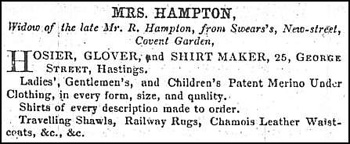[This document comes from Helena Wojtczak's English Social History: Women of Nineteenth-Century Hastings and St.Leonards. An Illustrated Historical Miscellany, which the author has graciously shared with readers of the Victorian Web. Click on the title to obtain the original site, which has additional information.]
"Upper" is the label given to those who managed to obtain a slightly higher level of income and status than others of their class; those who aspired to gentility, who perhaps tried to better themselves; the higher domestic servants, women with a trade, and shopkeepers.

If her education was good a young woman might become a governess. If her family had money they might set her up with a school or small business. Others would give lessons in their homes. Hastings & St Leonards had many private seminaries, and also National schools and church schools, in which infants and girls were taught by women. These schoolmistresses were unqualified because women were not admitted to any university or training college.
The two towns had an unusually large number of tradeswomen in a wide
range of occupations from printing to straw hat making. Our culture's idea of the
early-Victorian shopkeeper is stereotypically male; but this study reveals many female
entrepreneurs willing and able to run businesses. Some worked with their husbands
and inherited the business on his death. Female shopkeepers were particularly well-represented
in All Saints' Street and High Street, Hastings. These areas were old, run-down, and included
many tiny cottages
crowded together along narrow roads. Here, shop rents would have been cheap. Clothes were made
by hand and upon order, and, thanks to the large number of well-to-do ladies in Hastings, there
was plenty of work, in the summer at least, for dressmakers
and milliners.

The single occupation employing the greatest number of women after the mid-century was that of lodging house keeper. They were the mainstays of the tourist and visitor trade and their excellence must have contributed greatly to the commercial success of the town. Those in Hastings & St Leonards were so well thought of that in 1884 Conservative MP R.E. Smith argued that they deserved the vote. There were also some female publicans and hoteliers and house proprietors. A small number of women were employed in other miscellaneous occupations.
Last modified 2000